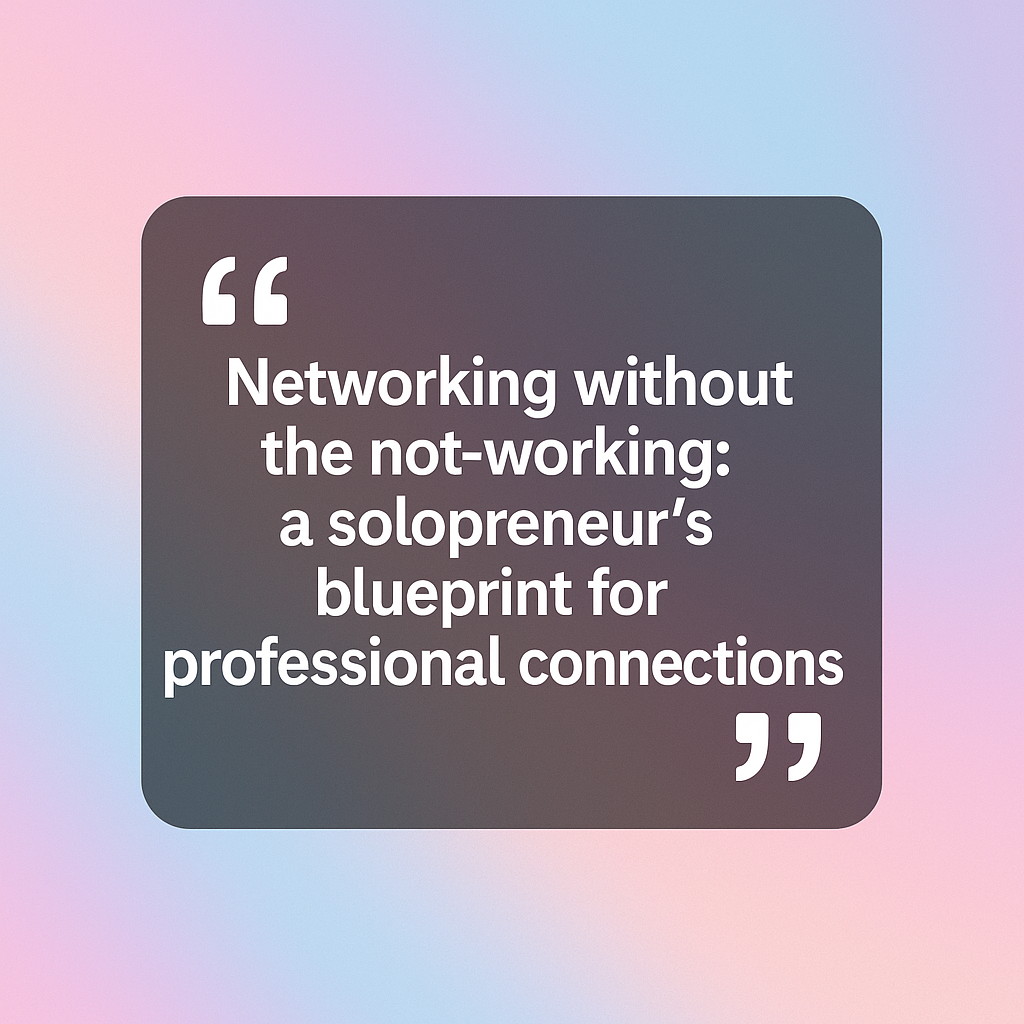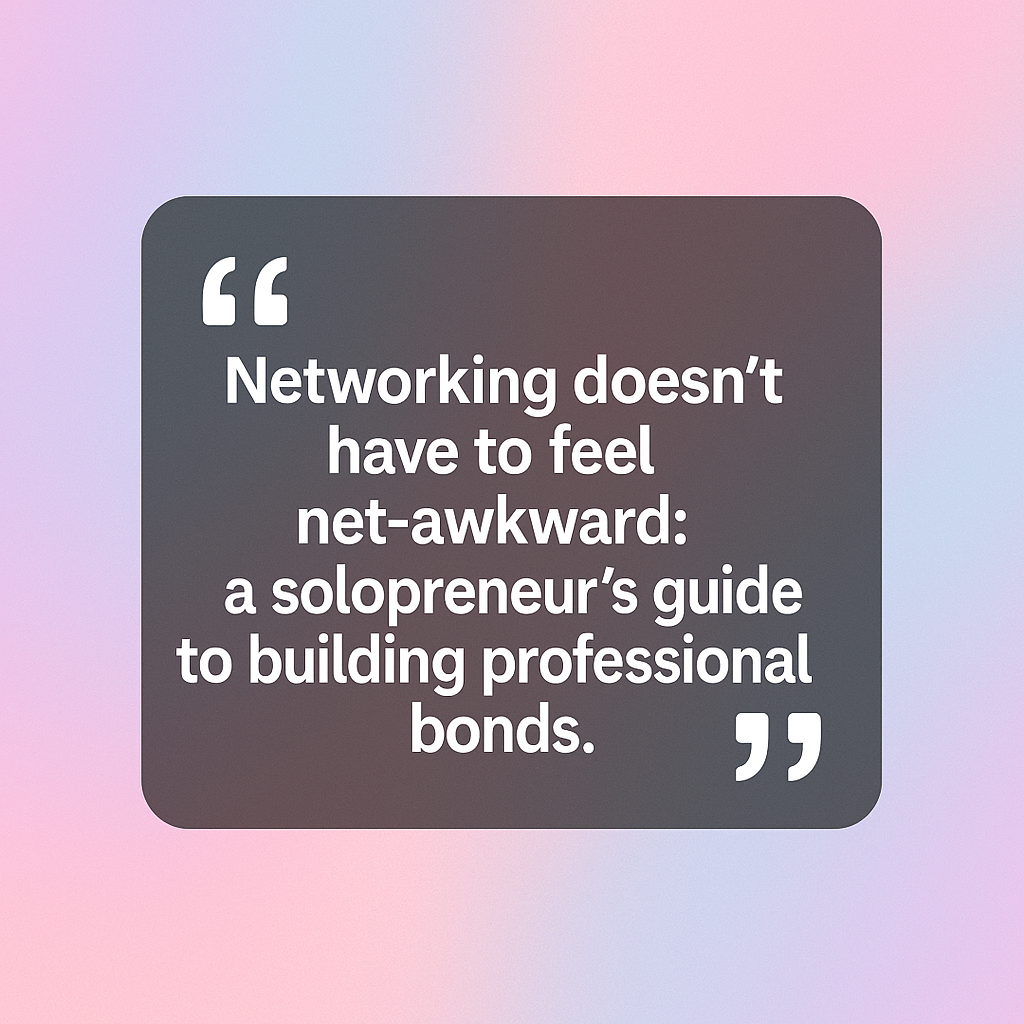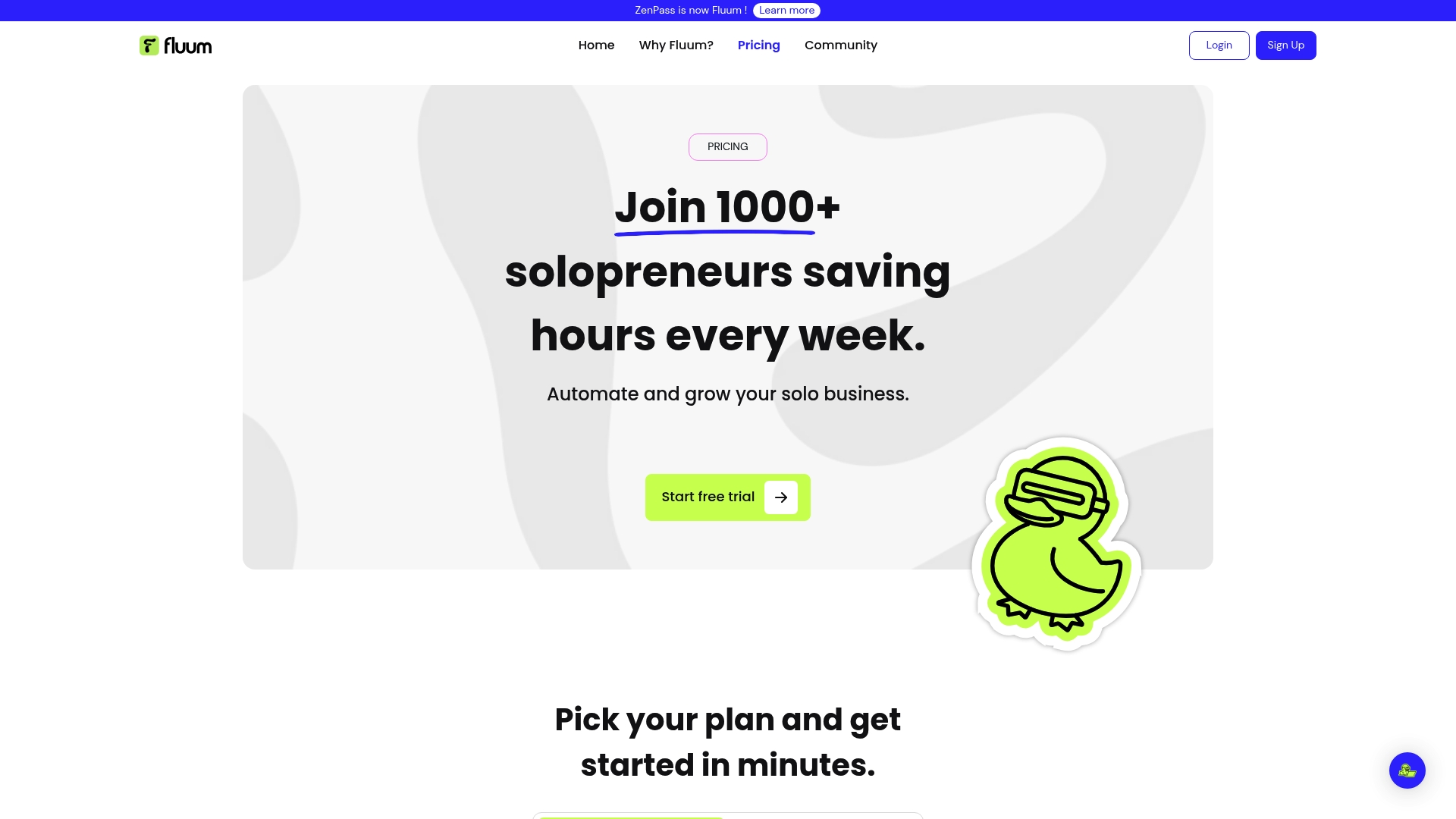
Did you know that 80 percent of professionals say networking is key to career growth? Meaningful connections do much more than fill an address book, especially for solopreneurs and freelancers whose success relies on trusted relationships. The real power lies in building professional networks rooted in trust, shared value, and respect. Strong relationship skills open doors to new opportunities, collaboration, and steady business growth where every interaction can shape your reputation and future prospects.
Key Takeaways
| Point | Details |
|---|---|
| Genuine Connections Matter | Building professional relationships is about creating authentic connections focused on trust, mutual respect, and collaboration rather than transactional interactions. |
| Diverse Relationship Types | Recognizing different relationship types—such as mentorship, peer networks, and strategic partnerships—allows solopreneurs to cultivate comprehensive networking strategies. |
| Emotional Intelligence is Critical | Mastering emotional intelligence enhances relationship building by fostering empathy, active listening, and effective communication, which are vital for sustainable success. |
| Avoid Common Pitfalls | To maintain strong professional relationships, avoid being too transactional, inconsistent, or overly self-serving in your approach to networking. |
Table of Contents
- What Building Professional Relationships Means
- Recognizing Key Relationship Types
- Emotional Intelligence In Connection Building
- Effective Strategies For Relationship Growth
- Pitfalls And Common Relationship Mistakes
What Building Professional Relationships Means
Building professional relationships is fundamentally about creating genuine, strategic connections that go beyond transactional interactions. For solopreneurs and freelancers, these relationships are the lifeblood of sustainable business growth. It means cultivating meaningful professional networks where trust, mutual respect, and shared value become the foundation of long-term collaboration.
At its core, professional relationship building involves intentional communication, consistent reliability, and demonstrating professional competence. This isn’t about collecting business cards or adding contacts on LinkedIn. It’s about developing authentic connections where both parties recognize and appreciate each other’s skills, perspectives, and potential contributions. Successful relationship builders understand that every interaction is an opportunity to showcase professionalism, reliability, and genuine interest in mutual success.
The essence of building professional relationships for service providers involves several key strategies:
- Active listening to understand client or partner needs
- Consistent follow-through on commitments and promises
- Providing value beyond immediate transactional requirements
- Maintaining professional boundaries while showing authentic personality
Understanding that professional relationships are dynamic ecosystems helps solopreneurs approach networking and collaboration with nuance. Each connection represents a potential pathway for learning, growth, referrals, and future opportunities.

The most successful professionals view relationship building not as a calculated strategy, but as a genuine approach to professional engagement that prioritizes human connection and mutual respect.
Recognizing Key Relationship Types
For solopreneurs and freelancers, understanding the nuanced landscape of professional relationships is critical to sustainable business success. Not all connections are created equal, and recognizing the distinct types of professional relationships allows for more strategic and intentional networking. These relationships fundamentally shape how service providers engage, collaborate, and grow their businesses.
Strategic partnerships represent the most powerful relationship type for independent professionals. These are deep, mutually beneficial connections where both parties have aligned goals and can provide meaningful support. Unlike casual contacts, strategic partners actively contribute to each other’s professional growth through referrals, collaborative projects, skill sharing, and genuine professional development support.
The primary relationship types for service providers include:
Here’s a structured comparison of the primary professional relationship types for solopreneurs:
| Relationship Type | Core Benefits | Connection Style |
|---|---|---|
| Mentorship Connections | Guidance Feedback Wisdom | Personal Development-focused |
| Peer Networks | Support Accountability Collaboration | Mutual Reciprocal |
| Client Relationships | Revenue Portfolio growth Potential referrals | Professional Value-driven |
| Referral Partners | Warm leads Business growth | Strategic Trust-based |
| Industry Collaborators | Skill sharing Joint offerings Cross-promotion | Creative Project-oriented |
- Mentorship Connections: Experienced professionals who provide guidance, feedback, and wisdom
- Peer Networks: Professionals in similar industries who offer support, accountability, and collaborative opportunities
- Client Relationships: Transactional yet potentially long-term connections based on delivering exceptional value
- Referral Partners: Professionals who recommend your services to their own networks
- Industry Collaborators: Professionals with complementary skills who can create joint offerings or cross-promote services
Successful solopreneurs understand that relationship management is not about quantity, but quality. Each relationship type requires a different approach, communication style, and level of investment.
 The most effective professionals cultivate a diverse network that provides multiple dimensions of support, learning, and potential business opportunities.
The most effective professionals cultivate a diverse network that provides multiple dimensions of support, learning, and potential business opportunities.
Emotional Intelligence In Connection Building
Emotional intelligence transforms professional relationships from transactional exchanges to meaningful human connections. For solopreneurs and freelancers, mastering emotional intelligence isn’t just a soft skill—it’s a critical business strategy that determines long-term success and client retention.
According to Gould Training, “openness, transparency, integrity, and accountability in communication build trust, mutual respect, and constructive dialogue.” This means going beyond surface-level interactions and creating genuine, empathetic professional environments where both parties feel understood and valued.
Key emotional intelligence skills for professional connections include:
- Active listening without interrupting or immediately offering solutions
- Emotional self-regulation during challenging conversations
- Empathy mapping to understand underlying client motivations
- Nonverbal communication awareness
- Conflict resolution through collaborative problem-solving
As Josh Dolin explains, emotional intelligence fundamentally enhances relationships by enabling professionals to express appreciation, set healthy boundaries, and navigate complex interpersonal dynamics with grace and authenticity. For independent service providers, this skill transforms potential networking interactions into lasting, productive professional relationships that drive sustainable business growth.
Effective Strategies For Relationship Growth
Building sustainable professional relationships requires strategic and intentional approaches that go beyond casual networking. Solopreneurs and freelancers must develop systematic methods to nurture connections that transform initial interactions into long-lasting, mutually beneficial professional partnerships. Strategic relationship growth is about creating meaningful touchpoints that demonstrate consistent value and genuine professional interest.
According to Wikipedia’s Business Networking research, effective networking involves deliberate information and resource exchange that fosters mutual adaptation and trust. This means moving beyond transactional interactions and creating opportunities for genuine professional connection through purposeful engagement strategies.
Key strategies for professional relationship growth include:
- Regular communication without constant sales pressure
- Providing unsolicited value through insights, introductions, or resources
- Maintaining consistent follow-up after initial interactions
- Creating personalized connection approaches tailored to each professional relationship
- Demonstrating reliability through predictable, professional behavior
For solopreneurs looking to expand their professional networks, understanding client management strategies becomes crucial. The most successful professionals view relationship growth as a continuous process of mutual learning, support, and collaborative potential. By approaching each connection with authenticity, strategic intention, and a genuine commitment to mutual success, independent service providers can transform casual contacts into powerful professional ecosystems that drive sustainable business growth.
Pitfalls And Common Relationship Mistakes
Professional relationships are delicate ecosystems that can quickly deteriorate when solopreneurs and freelancers make critical missteps. Understanding potential pitfalls is crucial for maintaining strong, productive connections that support business growth and personal reputation. Relationship management requires consistent awareness and intentional communication strategies.
According to LinkedIn’s professional networking advice, common relationship mistakes include being too self-centered, overly passive, rigidly structured, or dishonest. These behaviors fundamentally undermine trust and professional credibility, creating barriers to meaningful collaboration.
Key relationship mistakes to avoid include:
- Being too transactional without showing genuine interest
- Inconsistent communication that feels unpredictable or unreliable
- Neglecting emotional intelligence during interactions
- Oversharing personal information that breaches professional boundaries
- Failing to follow through on commitments and promises
- Lacking active listening skills
- Approaching relationships with purely self-serving motivations
As Expertia AI highlights, successful professionals understand that relationship building is about creating genuine connections. By avoiding these common pitfalls and maintaining a balanced, authentic approach, solopreneurs can transform potential connection breakdowns into opportunities for deeper, more meaningful professional relationships that drive sustainable business success.
Ready to Build Stronger Professional Relationships and Grow Your Service Business?
If managing your client connections, nurturing strategic partnerships, and avoiding common relationship mistakes feels overwhelming, you are not alone. This guide explained that for solopreneurs, building and maintaining high-quality relationships takes both emotional intelligence and consistent follow-through. You want authentic growth, reliable systems, and more opportunities with less stress. That is exactly where Fluum comes in.

Fluum is designed for service providers committed to making the most of every professional connection. Our all-in-one platform helps you streamline client management, stay on top of follow-ups, and automate the processes that cause burnout. Discover easy-to-use tools that let you focus on building trust and value instead of battling your workflow. Visit Fluum’s pricing page to start enhancing your business relationships today. Make the move now and see how Fluum helps you turn every quality connection into long-term growth.
Frequently Asked Questions
What are the key strategies for building professional relationships?
Building professional relationships involves active listening, consistent follow-through, providing value beyond transactions, and maintaining professional boundaries while showing authenticity.
How do I recognize different types of professional relationships?
The primary types of professional relationships include mentorship connections, peer networks, client relationships, referral partners, and industry collaborators, each providing unique benefits and requiring different approaches.
Why is emotional intelligence important in building professional relationships?
Emotional intelligence enhances communication, trust, and mutual respect, allowing professionals to navigate complex interpersonal dynamics effectively and create meaningful connections.
What common mistakes should I avoid when building professional relationships?
Common mistakes include being too transactional, having inconsistent communication, neglecting emotional intelligence, oversharing personal information, and failing to follow through on commitments.
Recommended
- Fluum | Effective Stress Management Techniques for Busy Professionals
- Fluum | How to Onboard Clients Effectively for Lasting Success
- Fluum | Master Managing Multiple Projects for Success
- Fluum | Build Your Brand with a Branding Builder in 2025
- Fluum | 7 Customer Retention Examples to Boost Your Business
- Understanding Nurturing Client Relationships For Success
- Master Dealing With Difficult Clients: Effective Strategies
- Understanding Effective Client Management Tips • Fluum.ai
- How To Onboard Clients Effectively For Lasting Success
- Website Design Guide for Builders: Create a Winning Website – ResponsiveWebsiteDesign



